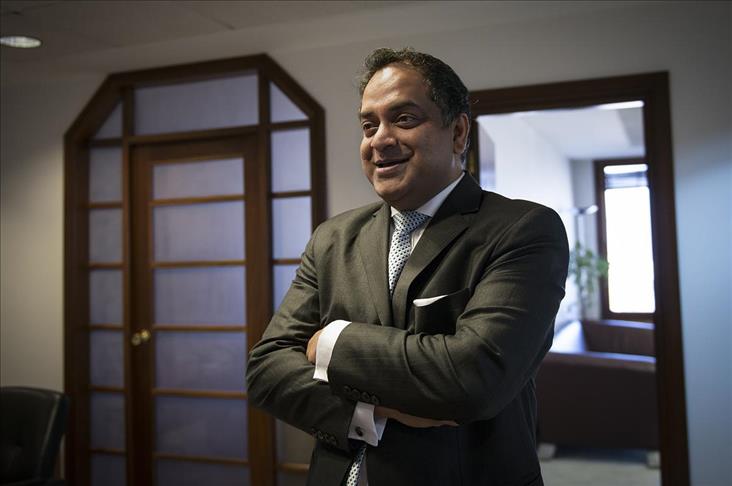
ISTANBUL
The Senior Resident Representative of the International Monetary Fund (IMF) to Turkey Srikant Seshadri believes that Turkey’s long-term future is bright.
“Of course, in the short to medium term, there are important economic issues to be addressed, in order to ensure that bright long-term future. By taking on these issues, Turkey has a golden opportunity to seize this important moment, and once again demonstrate to the world its well-known dynamism and resourcefulness,” Seshadri said.
Seshadri responded to Anadolu Agency correspondent’s questions on Fed rate hikes, the debt crisis in Greece, falling oil prices and geopolitical issues.
Seshadri shared his views on the implications of Fed rates hikes and a stronger dollar for emerging economies like Turkey.
He said, “In a purely financial sense, higher interest rates and a stronger dollar for a prolonged period could make it more expensive for those who have borrowed predominantly in dollars to repay or refinance their dollar-denominated debts. In a broader economic sense, such episodes of prolonged dollar strength, accompanied by higher interest rates, might reduce capital flows to emerging economies as a whole.”
Seshadri said that these capital flows, in turn, finance investment and growth.
“Indeed, past episodes of prolonged dollar appreciation in each of the last three decades have been associated with difficulties in some emerging-market economies, so the situation needs to be watched carefully.
"However, such effects can be managed. Broadly speaking, three attributes will be helpful for countries in coping with such periods. In addition to having a flexible exchange rate, and strong indicators of economic health, relatively low mismatches between the currencies in which borrowers earn their income and the currencies in which they have to repay debt, will be helpful in managing the transition smoothly.”
- “The direct channels through which problems in Greece can spill over to Turkey are very limited”
The Greek debt problem should not have an important effect on Turkish economy, Seshadri continued.
“The direct economic, trade, and financial links between Turkey and Greece are very limited. Therefore, the direct channels through which problems in Greece can spill over to Turkey are also very limited. There are also more indirect channels to keep in mind."
"In the past, a few unanticipated events related to Greece have caused brief episodes of higher aversion to risk among global investors, and brief periods of higher volatility in currency markets world-wide. But there are good reasons to hope that the necessary lessons will be drawn, and hopefully, the scope for unanticipated events related to Greece will be lower in the future.”
Seshadri noted that Turkey is blessed with a dynamic and enterprising private sector, plenty of investment opportunities, favorable demographics, and a favorable location--even if its neighborhood currently faces challenges.
“This is an opinion that is almost universally shared by investors globally. Of course, in the short to medium term, there are important economic issues to be addressed in order to ensure that bright long-term future.
"Most of these challenges center on increasing national saving, and on enabling the country to pull out of the current slow growth period in a lasting way. A re-alignment of macroeconomic policies toward higher saving and domestic investment, as well as the implementation of long-discussed structural reforms will be essential. "
"There is a strong level of understanding for what is needed, both in government, and in the public debate. By taking on these issues, Turkey has a golden opportunity to seize this important moment, and once again demonstrate to the world its well-known dynamism and resourcefulness.”
Seshadri pointed out that the effect of falling oil prices is, on balance, positive for Turkey’s economy.
“There are direct positive effects, and more complex indirect effects from lower oil prices. On balance, the direct positive effects are more powerful. Lower oil prices, if long-lasting, put more money in the pockets of households, and lower operating costs for many businesses. This tends to help growth positively, while placing downward pressure on inflation”.
Seshadri also said that falling oil prices help to improve Turkey’s overall balance of external trade, by making energy—one of its key imports—less expensive.
Seshadri noted that however, the indirect impact of oil prices on external trade is more complicated.
“Some of Turkey’s export markets like Europe also benefit from lower oil prices, which is good for Turkey, while others in the Middle East depend on oil for their growth.
"Therefore, in addition to geo-political factors, lower oil prices may depress exports to these Middle Eastern markets, as we have observed for the last few years. But putting it all together, Turkey undoubtedly benefits on the whole from lower oil and energy prices.”
Regarding the IMF’s year-end forecasts for Turkey's growth and inflation, Seshadri said:
“For now, we think growth will be around 3 percent, and inflation around 7 percent at year-end. We are monitoring the data closely, and need to see how the economy has evolved since the first quarter of the year."
"We need to look at the underlying drivers of growth since then, and their likely momentum. We also hope that recent improvements in inflation indicators will be maintained. As more data comes in, we will then assess the likely accuracy of our prior forecasts, and make adjustments if and as needed.”
Anadolu Agency website contains only a portion of the news stories offered to subscribers in the AA News Broadcasting System (HAS), and in summarized form. Please contact us for subscription options.

